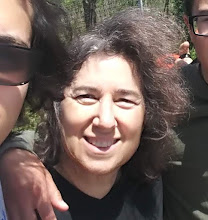It’s really not that surprising that Cincinnati’s German Jews have dominated all previous histories of the city’s Jewish community.. Members of the much larger population of Cincinnati Jews who come from an Eastern European background have rightfully complained about this bias, but there is no denying the compelling quality of Cincinnati’s mid-19th-century Jewish community and its descendants.
Cincinnati’s German Jews created the first central successful national organizations of American Jewish life. They had a huge impact on the cultural and civic life of Cincinnati. And, through many in-marriages, they all seem to be related to each other. Their family names quickly become familiar -- seeming to offer a coherent narrative of Jewish communal development – They easily seduce the historian who can trace the swath they cut through religious and municipal social reform and then even visit them in the Walnut Hills United Jewish Cemetery where so many rest in close and eternal proximity.
Much of my book, like those of my predecessors, will inevitably follow the character and achievements of this community, but I hope also to offer more than just the standard patronizing/patronized historical narrative about the complex relationship of the German and Eastern European (“Russian”) communities.
As the clever celebratory but racist couplet cited in my last post suggested, Cincinnati’s German Jews could play integral roles in every significant social/political reform movement in Cincinnati, but still not escape the prejudices of their times. It turns out that their propensity for clever skits and songs (referred to as “stunts”) over the holiday season (more later on the question of “Christmas”) can offer insight into the German/Russian relationship as well.
Set, apparently, to the tune of “Second Hand Rose,” one new year’s song (sorry, I don’t know the year, but it seems to have been written by Robert M. Senior during the 1920s), portrayed the fortunes of a girl whose Russian father had struggled in America until WWI-related prosperity enabled the family to move uptown to Reading Road in Cincinnati’s largely Jewish neighborhood of Avondale:
“Now I’ve got Reading Road clothes – Reading Road beaux
That’s why they call me – ‘Reading Road Rose”
Rose apparently attracts so much attention that they’ve had to bring in “a new traffic cop” to Avondale, but she’s still not satisfied, because “slightly north” of where she stands
“Lives a smarty set
And they don’t invite me – don’t invite me –yet.”
But don’t worry, she suggests,
“Don’t for a minute suppose, despite my Reading Road nose,
I’ll always be a Reading Road Rose”
With a (German-Jewish) doctor ready to take care of her troublesome facial extremity, she feels prepared to take on the snootier set, to make her mark not only in Avondale, but among the grand and gracious houses and community occupying the streets known as Rose Hill:
“I’ll bridge or dance or wear my new golfing pants
There isn’t a demand I won’t fulfill –
I’ll be coy – or I’ll be chilly, I’ll be sober or gay,
For where there is a will, I’m sure there’s always a way,
Once the crowd knows about this Reading Road Rose,
She’ll be Rosey – of Rose Hill.”
The large family group that gathered together on Rose Hill to enjoy this song, many of whom had devoted countless hours to improving the lot of Cincinnati’s immigrant Jews, clearly felt miles above the social climbing aspirations of Reading Road Rose, but she was also clearly a threat to them. More on this threat and another song ….. in my next post .
Source: Senior Family Papers, Ms. Coll. 139, uncatalogued Box 1, American Jewish Archives.
Thursday, July 26, 2007
Subscribe to:
Post Comments (Atom)


No comments:
Post a Comment